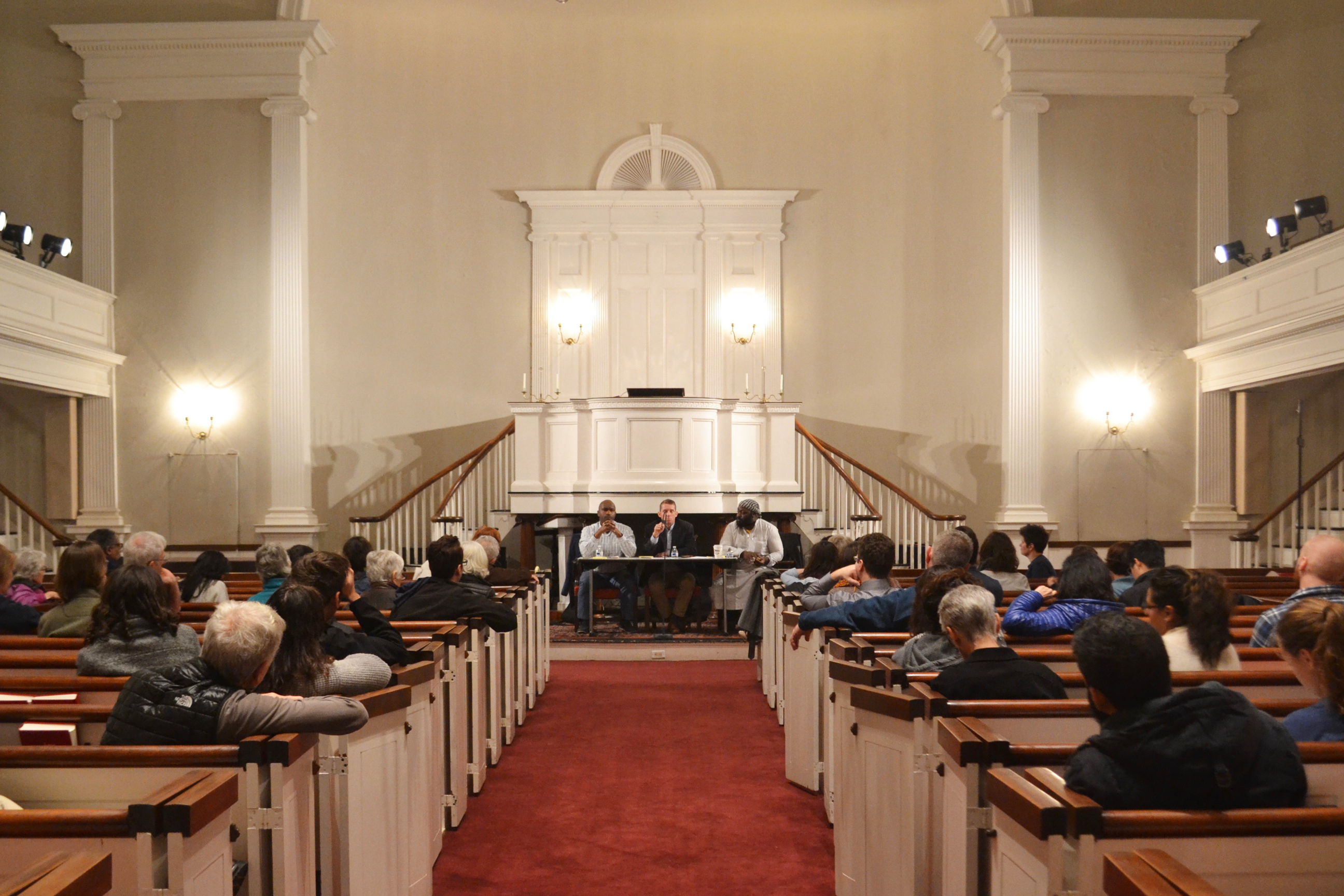
Nearly 70 people gathered at the United Church on the Green on Thursday for “Know Your Rights During Protests and Demonstrations,” a talk organized by Connecticut’s chapter of the American Civil Liberties Union to provide information about protesters’ rights in Connecticut.
The free public event — co-hosted by the Connecticut Criminal Defense Lawyers Association, Black Lives Matter New Haven and other local organizations — featured a discussion between Dan Barrett, ACLU-CT’s legal director and Leon Smith, the racial justice project director of the Center for Children’s Advocacy, which offers legal aid to underprivileged children across the state. Isa Mujahid, a former organizer at ACLU-CT and co-founder and organizing director of the racial justice organization CTCORE-Organize Now!, moderated the discussion.
“You’re in the room because you care about direct action,” said Melvin Medina, the advocacy and outreach director for ACLU-CT. He added that this talk was the first in a three-part series created to educate protesters and organizers in cities across Connecticut.
Orisha Ala Ochumare, one of the co-founders of BLMNH, opened the discussion by noting that she and two other women founded BLMNH last year to call attention to issues such as police brutality and the failings of the local public school system. Since she taught herself how to organize demonstrations, she said, she hoped the event would provide useful knowledge for fellow New Haven activists.
Beginning the discussion, Barrett said protest organizers should consider planning ahead by acquiring any necessary city permits, informing the police about the demonstration beforehand and creating a plan for making bail in case protesters are arrested. Smith added that organizers should read their town’s local ordinances and request a legal observer for the protest — an attorney who records any arrests or acts of intimidation that might occur against protesters by police officers.
“When police know they’re being documented and watched, that has a chilling effect on law enforcement overstep — not only arrests, but any inappropriate force,” Smith said.
Smith added that state law gives protesters the general right to record police actions. While he encouraged the documentation of excessive force against protesters, he also cautioned that if a protester gets too close to law enforcement officials while recording a video, he or she could be arrested for interference. Smith recommended stepping back and taking advantage of camera zoom features instead.
Protests that block traffic or take up an entire block of the sidewalk generally require city permits, Barrett said, though he added that the local government cannot refuse to provide a permit based on the content of the demonstration. Smaller protests and pamphlet distributions do not require permits, he added, though local jurisdictions sometimes impose their own regulations.
During an arrest, Smith said, one has the right to remain silent and to not consent to a search. In the case of civil disobedience, if a protester gives his or herself up willingly to an arrest and an officer uses excessive force, the individual should file an Internal Affairs report, he said.
“The reality is that the act of civil disobedience is a true act of courage because you’re putting your liberty on the line to stand for the greater good, and you can never lose sight of that,” Smith added.
When the floor opened for audience questions, residents of Greater New Haven asked about the specific charges protesters could expect during an arrest and what kinds of public spaces could be used for a demonstration without a permit, among other issues.
Gregory Feeley, an English professor at Gateway Community College, said he was part of a 2003 demonstration against the Iraq invasion. During the protest, hundreds of protesters surrounded a federal building in Hartford.
Since the police were not contacted beforehand, Feeley said, the protest took them by surprise, and they responded by treating the protesters with “petty, vindictive” behavior. After that experience, he said, has always wondered about the merits of contacting the police before a protest occurs.
“By reaching out to the police beforehand, you’re hoping that you prevent the over-the-top behavior you’re describing,” Smith said. “If you’re going to do a spontaneous protest, you absolutely should have a legal witness.”
Medina said organizers should consider using a police liaison-—a member of the group who can negotiate with police officers while keeping the identity of the organizer hidden.
One audience member asked about the specific civilian rights that could be infringed upon by a Trump administration.
“I think the Bill of Rights in general is under siege,” Smith said. “As lawyers, we’re going to stand up and fight, but there are going to be lots of battles, to say in the least.”
Barrett added that the 14th Amendment — the right to equal protection under the law — seems to be most endangered, particularly with “whispers of white supremacy” in the next federal government. He said the ACLU’s work, which is rooted in racial justice, could potentially be threatened.
Following the event, Feeley noted that he has been participating in protests in the area for the past few decades, including the 1984 protest in New Haven which resulted in the creation of Local 34, Yale’s clerical and technical workers union. Recently, he said, he was concerned by an incident in which a New Haven Police Department officer harassed one of his students, and that he attended the event to learn about civilian rights during interactions with the police.
“I’ve recently gotten involved in more social action, but I didn’t know what my rights were,” said Andy Shaefer, a Hamden resident and Showing Up for Racial Justice member. “I thought this was a really good forum for getting into that. What you realize is how complicated the process can be for things to be effective.”
The Connecticut chapter of the ACLU is one of 53 nationwide affiliates.







